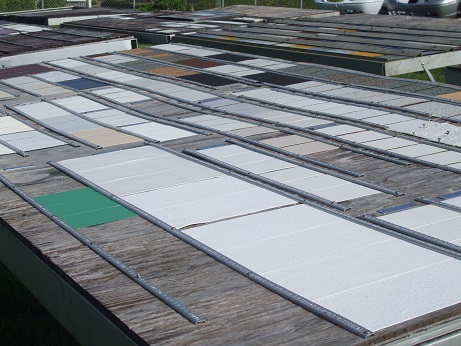Atlas' test capabilities in the field of environmental testing include Temperature/Humidity Cycling, High Temperature, Low Temperature, and Temperature Shock conducted in accordance with the appropriate MIL-STD specifications. Temperature/Humidity Testing (MIL-STD-810D, 202D, etc.) Number of Chambers: 2 Volume: 1.7 m3 (64 ft3) Interior Dimensions: 1.2 x 1.2 x 1.2 m (4 x 4 x 4 ft) Temperature Range: -73¡ C to 175¡ C (-100¡ F to 350¡ F) Humidity Range: 20 to 95%

CRRC Testing
The Cool Roof Rating Council (CRRC) has designated Atlas Weathering Services Group as the "first" approved Test Farm facility for the CRRC's Product Rating Program. To earn the coveted CRRC rating, roofing manufacturers and sellers must perform weathering tests through Atlas for three years at locations in Florida (hot/humid), Arizona (hot/dry), and Chicago (cold/temperate).
The CRRC's product rating program is designed to provide third-party verification of weathered performance claims to help purchasers in the selection of cool roofs that save energy and reduce a building's impact on the environment.
The CRRC's rating program authorizes manufactures and sellers to label roofing products to indicate their Initial Radiative Properties and Aged Radiative Properties. Certification is a three-stage process:
1. All production-line roofing products must be initially tested by an Accredited Independent Testing Laboratory (AITL) in order to assess their Initial Radiative Properties.
2. The products must then be weather-tested at the Atlas Approved Test Farms.
3. Finally, after weathering the roofing products at Atlas facilities, an Aged Radiative Property can be determined by an AITL.
CRRC schedules four weathering cycles during the year - commencing March 21st, June 21st, September 21st and December 21st. Test Specimens must be provided to Atlas's Arizona facility at least 10 days prior to those dates to ensure timely distribution to all test farm locations.
The Cool Roof Rating Council was created in 1998 to develop accurate and credible methods for evaluating and labeling the solar reflectance and thermal emittance (radiative properties) of roofing products, and to disseminate the information to all interested parties. Based in Oakland, California, the CRRC is incorporated as a non-profit educational organization.

